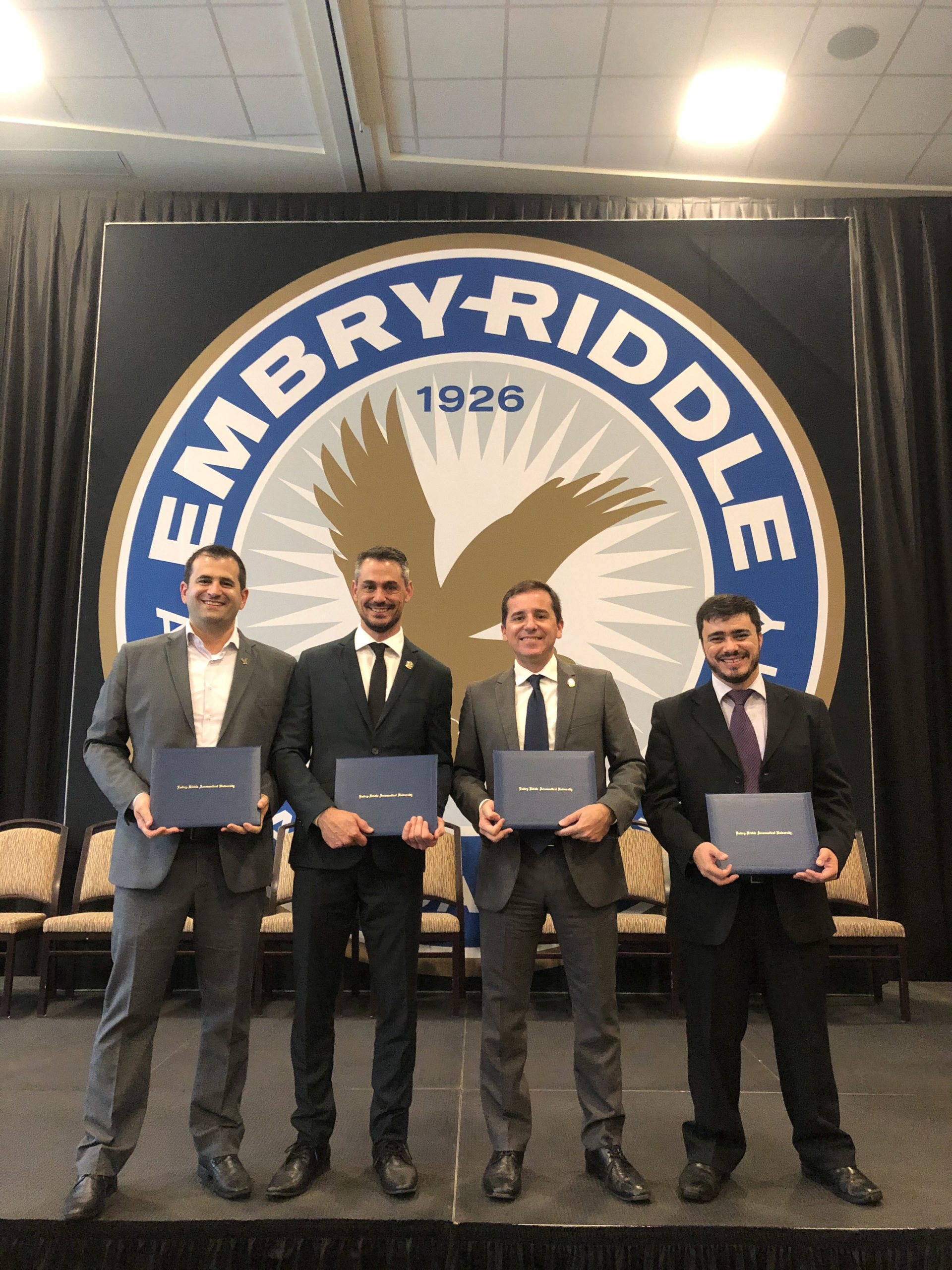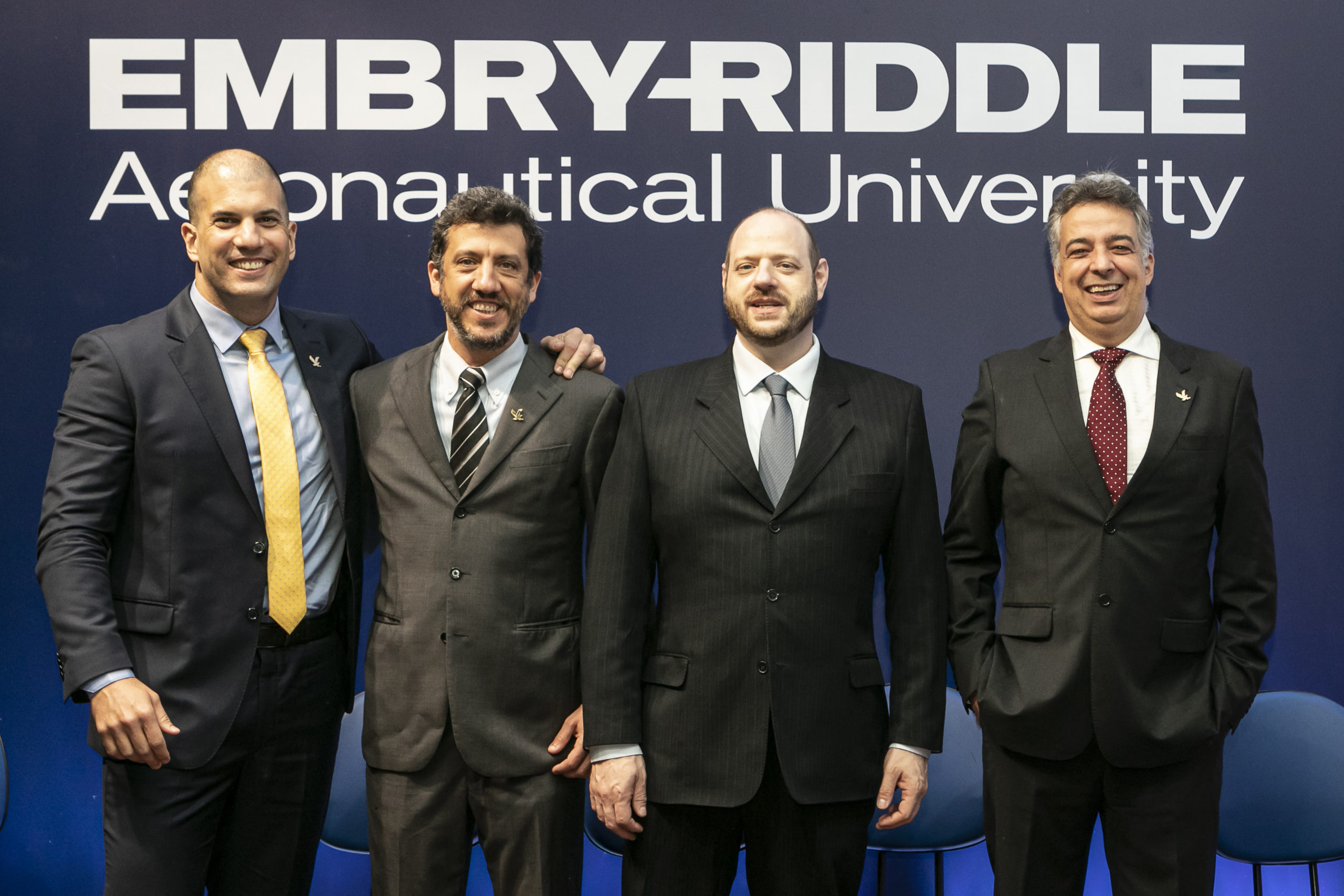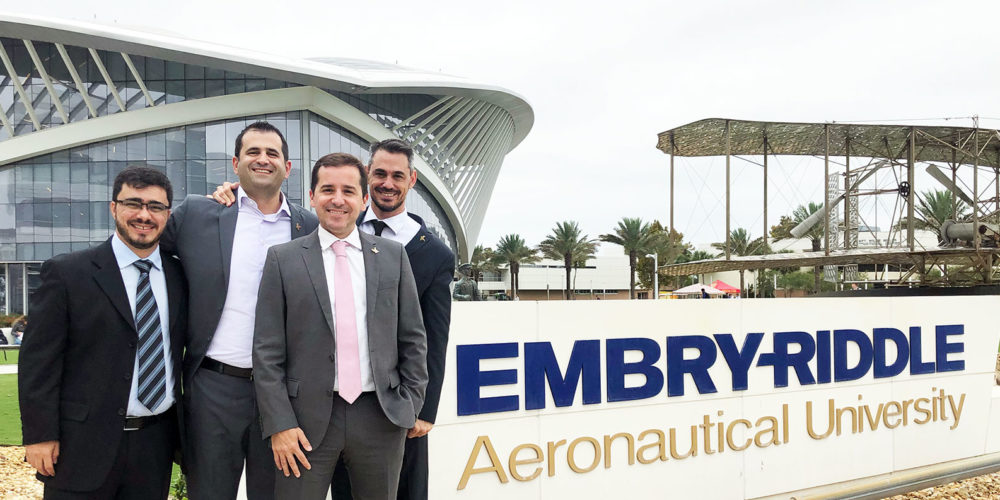Students of the Embry-Riddle Aviation Management program in Brazil, offered through the Worldwide Campus, are putting their capstone projects to work — to bring about positive change for the aviation industry in Brazil.
The 2019 student cohort used their research findings to convince regulators in Brazil to change fuel requirements for airliners, resulting in cost savings for Brazilian airlines in the millions of dollars. The 2020 cohort is on the verge of accomplishing something similar.

The 2019 Aviation Management cohort consisted of 30 students. Diogo Youssef (’20), Fabiano Gomes (’20), Joao Centeno (’20) and Luciano Oliveira (’20) were the four students that together developed their capstone research centered around lowering Brazil’s contingency fuel requirements from 10% to the international standard of 5% for airliners.
Contingency fuel regulations require that a certain amount of fuel be carried for unforeseen occurrences, such as the pilot’s need to deviate from original routes that would necessitate an increase in fuel consumption.
The International Civil Aviation Organization (ICAO) standard calls for flights to have 5% of contingency fuel, and this is the practice in most other areas of the world. Regulators in Brazil had considered this standard but did not decide to make a change until presented with the Embry-Riddle students’ research.
Based on the students’ work, the Associação Brasileira das Empresas Aéreas (ABEAR) proposed the changes to the Agência Nacional de Aviação Civil (ANAC), which reviewed and supported the changes in February 2020. A new law went into effect on April 1, 2020.
The students’ research was published in the International Journal of Aviation, Aeronautics and Aerospace (IJAAA), the peer-reviewed journal of Embry-Riddle Aeronautical University’s Worldwide College of Aeronautics.
“This was the first time we were able to bring a published paper into the discussion, with the Embry-Riddle stamp on it. Embry-Riddle carries a lot of weight, and it’s accepted that we have done our due diligence in the research,” says Oliveira, flight standards senior coordinator for LATAM Airlines Brazil.
“As we considered our capstone project, we understood that the industry had given us this great opportunity,” says Youssef, flight dispatch manager for Azul Airlines. “We realized we were in a position to give something back to the industry.”
The students gathered data from airlines around the world and more specifically, Brazil. They ran simulations to determine how much fuel was used and how much would be left if the contingency fuel requirement was changed from 10% to 5%.
Massoud Bazargan, professor of operations research and operations management at the O’Maley College of Business, led the students through the process of running the simulations.
“Dr. Bazargan is one of those professors you don’t forget — the professor of professors,” Youssef says. “He explained the simulations, and we created a mathematical model and simulated over one million flights. We simulated five times more flights than in the real world, and we didn’t find any aircraft landing in emergency conditions.”
An International Perspective on the Aviation Industry
The Aviation Management program in Brazil began in 2016 as a professional and international certification. It is currently educating its fifth cohort of students with a sixth cohort expected to begin in September.
“This kind of result proves the success of the program for Embry-Riddle,” says Israel Treptow, executive director of the Central and South America Worldwide Campus. “The main idea behind the program is to select aviation professionals who are working for one of the big three airlines in Brazil and to give them an international perspective on the aviation industry — on the management side of it.”
The 15-month program, which expands Embry-Riddle’s international outreach, is offered in partnership with Confederação Nacional do Transporte (CNT), Serviço Social do Transporte e Serviço Nacional de Aprendizagem do Transporte (SEST SENAT), Instituto de Transporte e Logística (ITL) and ABEAR. The students’ tuition is fully funded by CNT and SEST SENAT, according to Treptow.
“Candidates undergo a selection process by the three major airlines in Brazil, and anyone who works for one of those airlines is eligible to apply,” Treptow says. An interview and competitive selection process follow.
Last year, 135 people applied for the program and 30 were selected, Treptow says.
“That was huge — and with COVID going on. We expect that this year the number of applications will be even higher,” he says. “That’s another metric we can use to prove the success of the program in Brazil.”
Leila Halawi, associate professor and program chair for the Master of Science in Aviation and Aerospace Sustainability, worked with Aviation Management students in 2018, 2019 and 2020, leading them through their capstone projects.

“This certificate program is comparable to a master’s degree. It’s not a traditional program. The capstone project is reviewed by a committee comprised of executives from the airline industry, executives from the national transportation system and executives from the civil aviation industry in Brazil,” Halawi says. “The students in the program are elite, and it is so humbling for me to work with them. I feel a bit of privilege to be able to work with such high-caliber professionals.”
Four other students of the 2020 cohort are going in a similar direction. Aldo Bien (’21), Daniel Ribas (’21), Paulo Pacheco (’21) and Rodrigo Cardoso (’21) are working to bring change to Brazil’s aviation regulations with their capstone research findings in a paper titled, “In-Flight Fuel Management and Committing to the Destination.”
“The 2020 project was presented before ANAC in March, and the students also argued for a major change in legislation,” Halawi says. “It is still in the negotiation phase.”
